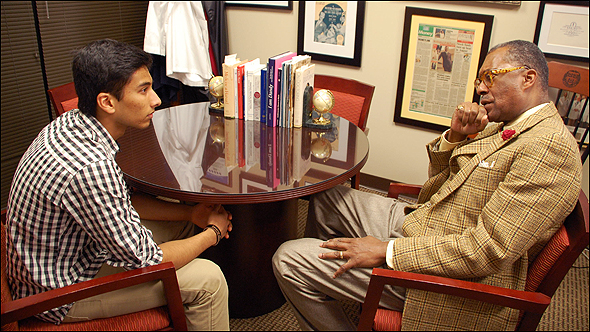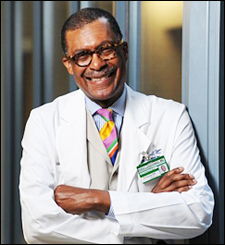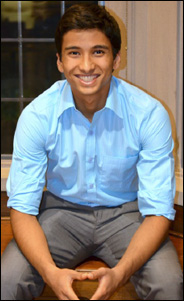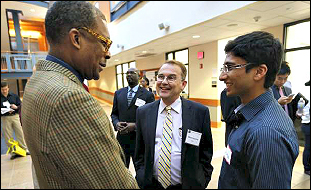
A new program dedicated to fostering meaningful relationships between Vanderbilt’s School of Engineering students and university alumni through academic, professional and personal life experiences is paying dividends for one such pairing.
Launched last fall, the VUSE Alumni Mentor Program is a reimagined mentorship structure requiring a yearlong commitment and regular one-on-one communication.

Cardiologist Andre Churchwell, senior associate dean for diversity affairs at Vanderbilt’s School of Medicine, who graduated magna cum laude in biomedical engineering from Vanderbilt in 1975, heard about the program at a faculty meeting and immediately told Dean Philippe Fauchet, ‘Sign me up.’ Aditya Karhade, a junior studying biomedical engineering and neuroscience, jumped at the chance to apply for the program.
The two were partnered and, even though they have completed only half of the inaugural year, are equally impressed with the program and with each other.
During one of Karhade and Churchwell’s formal gatherings there was a discussion about Churchwell’s ink sketch of the transformation of physician Bruce Banner into Marvel Comics’ Incredible Hulk, the construction and deconstruction in jazz music, and how the principles of poetry can benefit students in difficult engineering classes.
“I have gained tremendously from interacting with Dr. Churchwell,” Karhade said. “In the time I’ve spent with him I’ve witnessed his interests in art, including poetry and drawing, his dedication to fundamental research, and his impeccable care for patients.”

Last semester Karhade was enrolled in both transport phenomena and poetry classes. One day he waked into the engineering class to find a block of text on a piece of paper. There were no other instructions. “So, you had to read that paragraph of text and from there choose the appropriate details to try and arrive at a solution to the problem,” he said. “I thought that was similar to poetry – to writing a poem, where you kind of have to choose the specific details you are going to write about — what you want to leave in to grab the audience’s attention and what details you want to leave out that are extraneous.”
Churchwell believes that creative people, especially in science, use their creative side to help come up with ideas about science or applied physics. He credits his Vanderbilt undergraduate studies and their influence on him, especially biomedical engineering.
“BME informs everything,” he said. “I can think better, think longer, think stronger than most of those guys because of my Vanderbilt BME training. Now I may be biased, but BME to me is probably one of the great disciplines for an undergraduate kid who wants to learn how to think both critically and creatively.”
How the Alumni Mentor Program works
The mission of Vanderbilt University School of Engineering’s Alumni Mentor Program is at once both simple and profound — to foster meaningful and productive one-on-one relationships between alumni and students of the School of Engineering through the sharing of professional and life experiences.
The program aims to strengthen alumni connections with VUSE while putting students on the path to success. Assistant Dean Burgess Mitchell and Program Coordinator Emily Del Monaco serve as staff contacts. Participants, however, assume responsibility for their relationships.
Mitchell said Dean Philippe Fauchet conceived the pilot program and personally recruited many first-year mentors – alumni he knew where interested in giving back or reconnecting with their alma mater. Among the first was cardiologist Andre Churchwell, a 1975 graduate in biomedical engineering, now senior associate dean for diversity at Vanderbilt’s School of Medicine.
Basically, the Alumni Mentor Program:
- Seeks primarily sophomore and junior engineering undergraduates;
- Involves initial year-long commitments from students and mentors that may be renewed throughout the student’s undergraduate career;
- Targets VUSE alumni who are at least three years out from the time they completed their bachelor degrees;
- Requires at least monthly communication based on what works best for each pairing (face-to-face visits, phone calls, video chat, e-mails or text messages);
- Offers an online handbook that serves as the primary guiding resource.
In the fall, students and alumni apply, write short bios, and are paired based on common interests and disciplines.
“The goal was to ‘connect,’ and the pieces were in place,” said Mitchell. “It really became a case of ‘if you build it, they will come,’ and they did.”
Learn more via Email, or at (615) 343-8061.
At the same time he credits strong mentors for framing his academic beliefs, which is why he’s dedicated to the new program.
Churchwell and Karhade have one large advantage however – they are on the campus at the same time. Most of the 102 alumni mentors are working in other states or other countries.
“The goal is to connect, and the program really is going well in that regard,” said Burgess Mitchell, assistant dean for Student Affairs in the engineering school, and one of the program coordinators. “They (Churchwell and Karhade) are fortunate that they can meet face-to-face.” Others are connecting on Skype, email, or by phone, he said.
The program drew 150 students, according to Mitchell, who anticipates a higher number next year as the mentees share their experiences with other students. Since the program emphasizes more experiences and fewer lectures, it’s less an apprenticeship, and more a meeting of the minds – which is why one-on-one communication is essential to its success. In conversation, mentors take an interest in their student’s research, career choices, and to some degree their sense of purpose.
Churchwell acknowledges his role is not to confine Karhade to one area of study, such as cardiology, which is the doctor’s primary focus. He would rather expose him to all the work that is going on here and allow him access to all those things.

In some ways, a strong academic mentor is the one thing Karhade really hasn’t had. Much of his success in school he did on his own. He was born in India, but came with his family to Jacksonville, Fla., at age 9. In high school, he became fascinated with biology, chemistry and physics, but a volunteer stint at the University of Florida’s Health Center for Simulation Education and Research facility cleared a path toward biomedical engineering and neuroscience studies.
“I was fascinated by the application of basic mathematical and analytical models to understand the most complex machine in the world, the human body.”
Soon after, he had a full scholarship to Vanderbilt and “felt at home” when he visited the Nashville campus for the first time. His application was based on the strength of the biomedical engineering department. Now, after initial meetings with Churchwell, Karhade he can see where he wants to be in 10 years.
“Following Dr. Churchwell’s example, I hope to be a physician with the mind of an engineer and the heart of a humanist.”